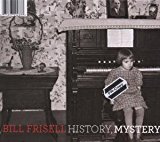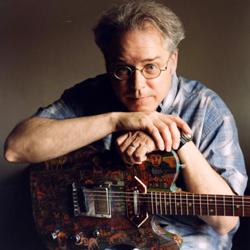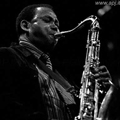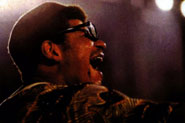Bill Frisell, Odean Pope & Sunny Murray Live
There was a study in opposites that should have been studies in confluence this weekend. Two shows of jazz adventurers tried to grace Philadelphia. One of them succeeded.
 On Sunday Night, June 14, 2009, Bill Frisell’s long time, road-tested trio of bassist Tony Scherr and drummer Kenny Wolleson took the stage at World Café Live. It was an evening of delirious ebbs and flows. Songs emerged out of abstract conversations, fractured loops and space percussion. Frisell and company are an intuitive group, able to shift gears and divine currents from the most abstruse signs and then coalesce around a folk-hewn theme or be-bop motif.
On Sunday Night, June 14, 2009, Bill Frisell’s long time, road-tested trio of bassist Tony Scherr and drummer Kenny Wolleson took the stage at World Café Live. It was an evening of delirious ebbs and flows. Songs emerged out of abstract conversations, fractured loops and space percussion. Frisell and company are an intuitive group, able to shift gears and divine currents from the most abstruse signs and then coalesce around a folk-hewn theme or be-bop motif.
The trio has the oddest stage presence. Wolleson seems like a drunken accountant, wearing a sport coat and tie, his head lolling around and arms flailing like he’s trying, but not locating his center of gravity. Scherr treats his bass like a dispassionate dance partner, tossing it about or draping himself across it, taking seemingly careless swipes at the strings. Frisell seems lost in some interior world, deciphering code that only he can hear. But the sonic results are anything but drunk, disorderly and distant.

Bill Frisell
Wolleson is a font of percussive invention, swinging like a demon one moment, sashaying down a rhythm alley the next. Scherr is a muscular player and you can tell Frisell looks to him as an anchor as the bassist nails counterpoints and pedal notes against Frisell’s sometimes laconic, sometimes acid-laced melodies. I called Frisell a jazz artist, but he’s really a genre unto himself. His set swung from Hank Williams tunes to the Ventures-style riffing. He dipped into some Ali Farka Toure African cross picking and created textural loops playing a music box against his guitar strings. He brought the house down with a fuzz-drenched, digitally delayed psychedelic solo that emerged out of an almost classical call and response with Scherr. This may be the best trio working in music today.
Look for Frisell’s new album, Disfarmer, due out next month. It’s another chapter in his twisted americana foray playing with a percussion free string quartet of pedal steel guitar, bass and violin. The album’s inspired by the B&W photography of Disfarmer, an obscure portrait photographer from the 1930s with an uncanny sense of light and setting.
The Bill Frisell Trio regard the stage as a sacred place, although with none of the piety that might indicate. Sunny Murray, however, has a different regard.
The father of free jazz drumming who came to renown with Cecil Taylor, teamed up with Philly favorite son, saxophonist Odean Pope, a veteran of Max Roach‘s group from 1977 until the drummer’s death. Performing June 12, 2009 at the Philadelphia Art Alliance and produced by Ars Nova Workshop, it should have been a gig that recalled the old days of the Empty Foxhole, a legendary

Odean Pope
Philly basement jazz club where Pharaoh Sanders, Cecil Taylor, the Art Ensemble of Chicago and many other new jazz stalwarts held forth, and where Pope had played with his group Catalyst. Instead, after a tentative duet of shuffling, fractured rhythms from Murrary and some short riffs and worried motifs by Pope, Sunny Murray spent most of the performance stumbling off his drum stool, lurching through the crowd and talking loudly while Pope gamely tried to keep some semblance of a concert together. Left to himself for most of the gig, Pope padded time with a lecture and demonstration on Clifford Brown. Just as he was wrapping it up, Murray staggered back to the stage and grabbed the mic.
“I just want you to know, I’m not drunk,” he asserted in a slur. He blamed arthritis and numb

Sunny Murray
legs, both plausible in the septuagenarian drummer, but not really good excuses for boorish behavior before a capacity crowd that was far more forgiving than he deserved. After all that, and despite Pope’s best efforts to end the show, Murray took his drum stool and played a half-decent solo, while Pope looked on, barely disguising his incredulity, waiting for the nightmare to end.
I haven’t seen Murray play since the 1970s. My last recollection was a concert he played at Calvary Church in West Philadelphia upon the release of his Apple Cores album on Philly Jazz. After a dispute with the band, Murray took the stage solo and beat out a single rhythm for about half an hour. Not much has changed. Sunny Murray was a radical drummer and his work with Cecil Taylo, Albert Ayler and others helped shape jazz of the 1960s. I’m listening to his self-titled 1966 album on ESP-Disk and am still overwhelmed by his power. But while Bill Frisell quietly and without intent, secures his legend, Sunny Murray loudly dismantles his.
John Diliberto ((( echoes )))
